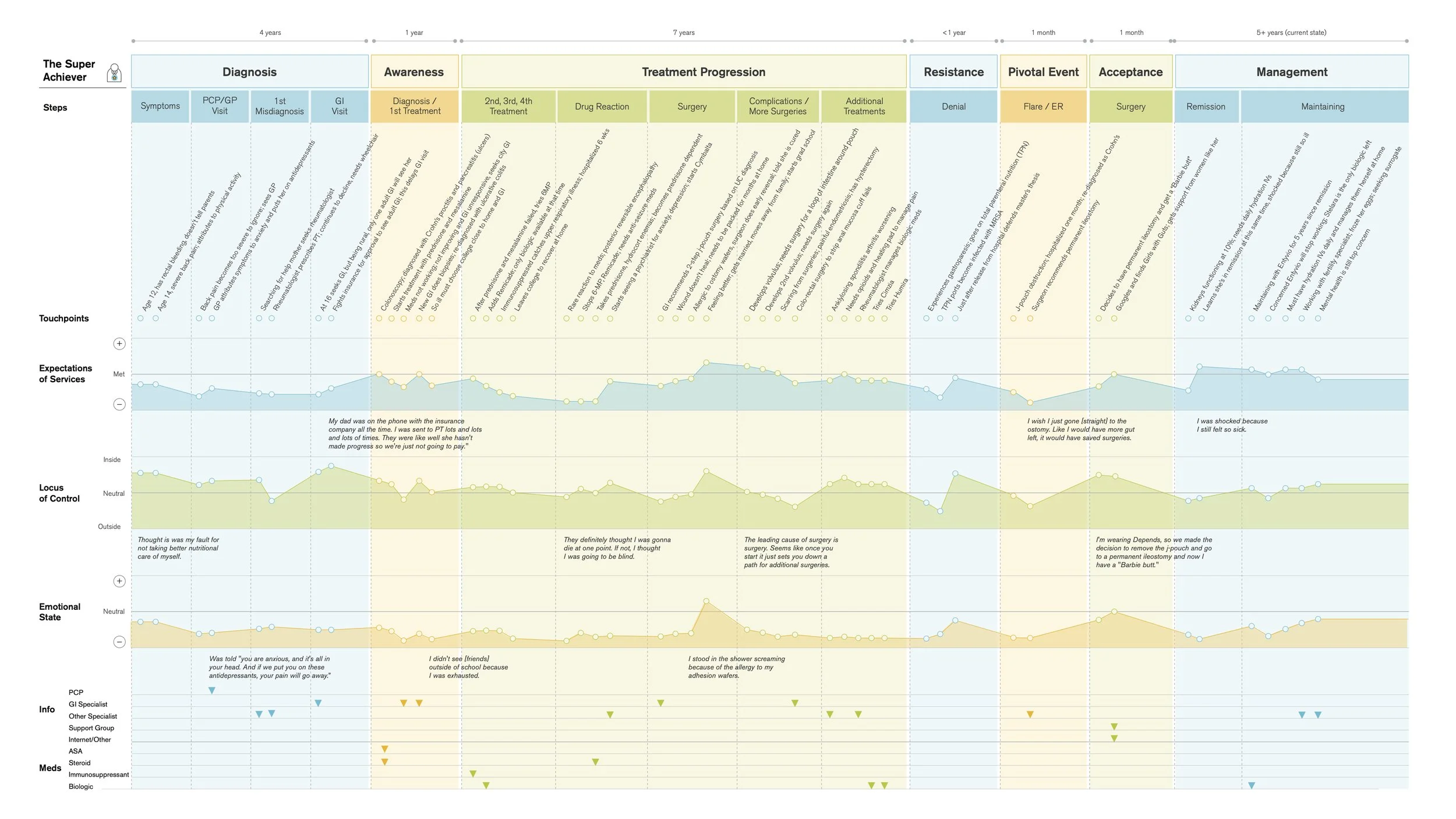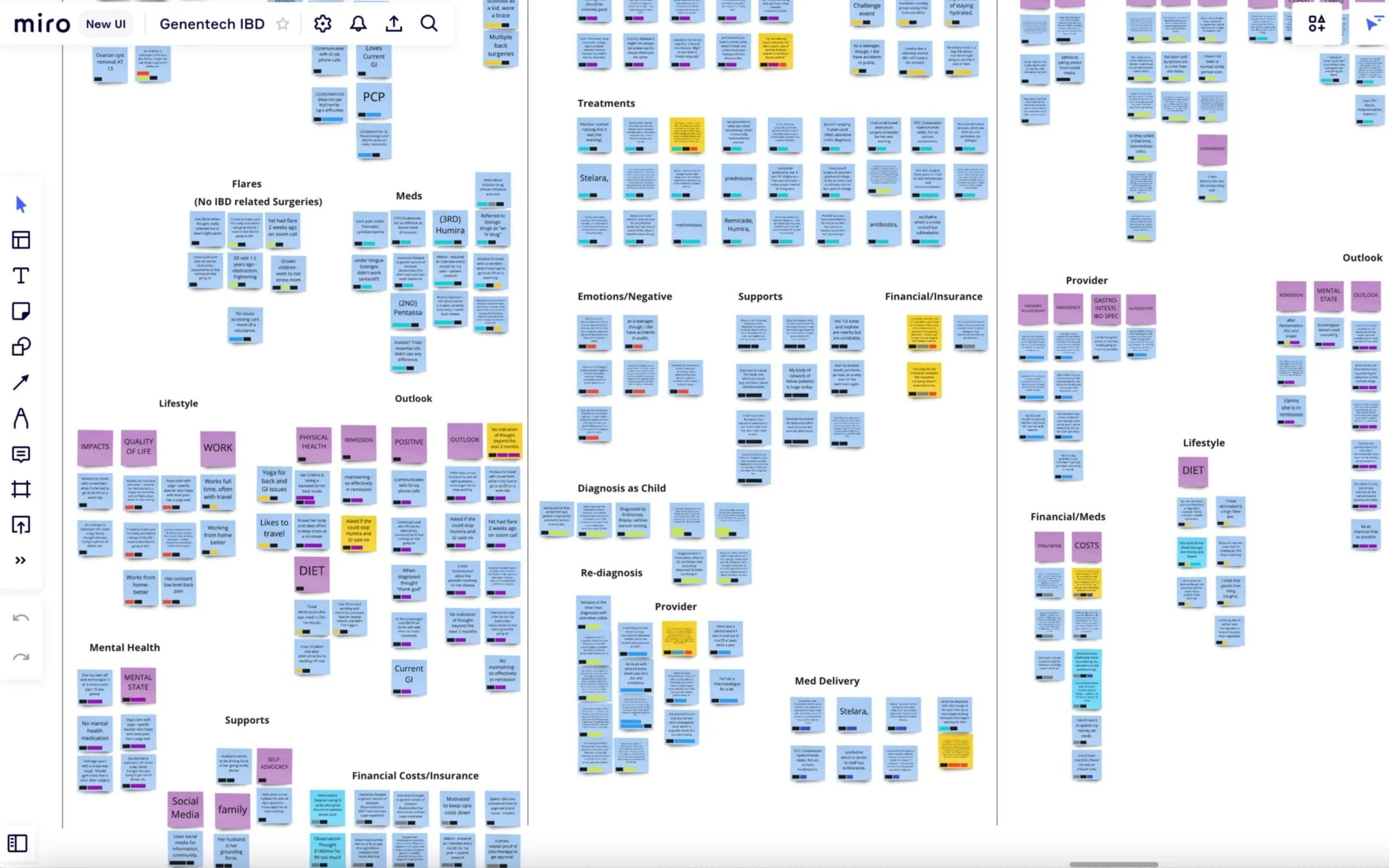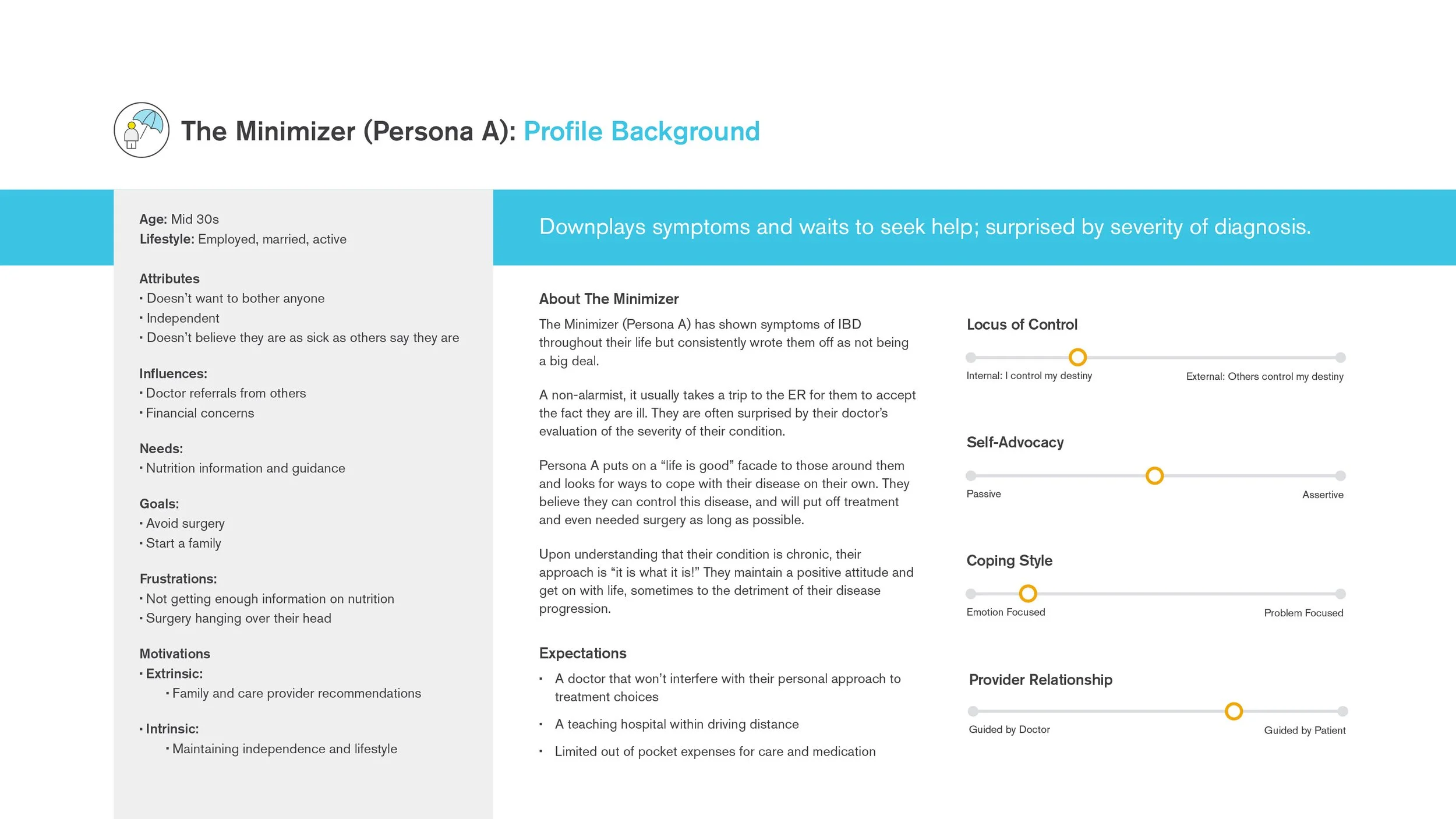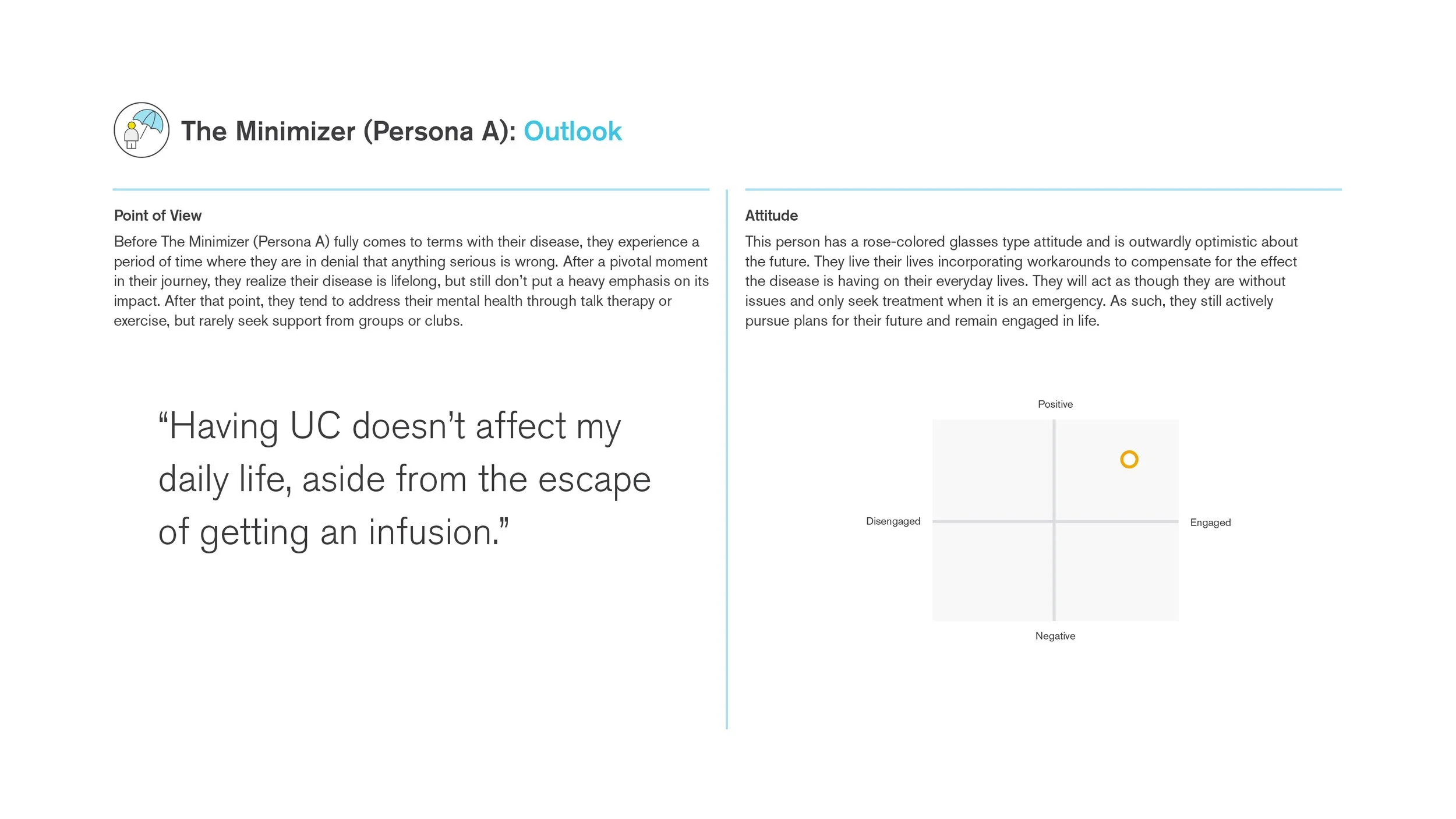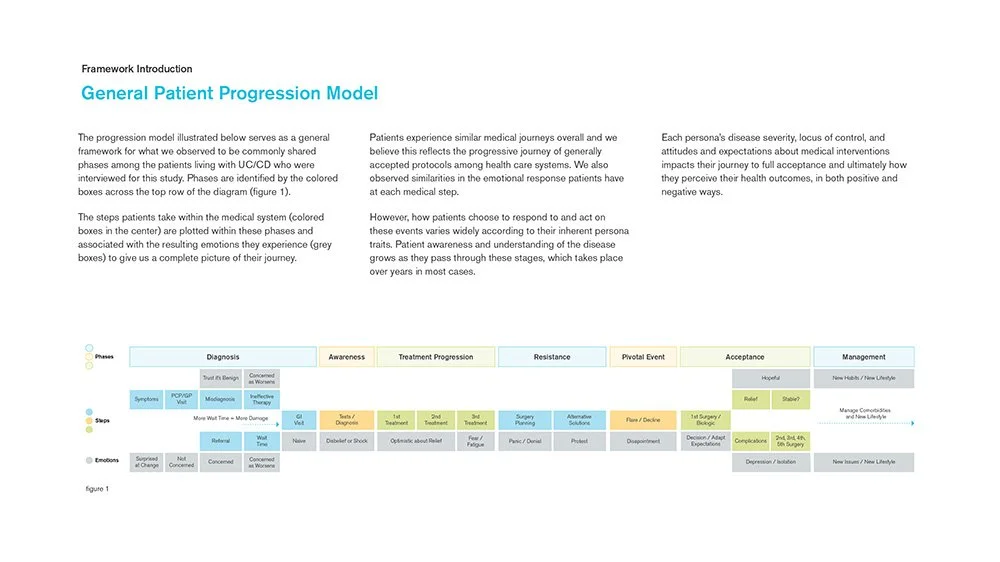Crohn’s and Ulcerative Colitis Patient Profiles Study
One of the five maps that describe the journey of a patient with Crohn's disease or ulcerative colitis, from the first symptoms through living with the chronic condition.
The Challenge
Genentech Pharmaceutical was in clinical trials with a new drug to treat Crohn’s disease and ulcerative colitis. They wished to know more about the patient experience from first symptoms to diagnosis, therapies, and hopefully, stable disease management. The study called for service design and journey mapping with rigor applied to the research design so that it would become a white paper (published 2022) and a conference poster for medical providers.
Activities Included:
Leading the plan, process, and team of 3
Design of research strategy and methods
Research objectives and interview guides
Recruitment in 4 geographic US regions
Screening criteria and document
Project management
Data Collection
Participants were asked to keep a pictoral diary for one week of their lifestyle. We discussed these images in the interview to better understand their daily habits, limitations on foods, medication regimens, level of disablement from their disease and general outlook on life. In our analysis
Activities Included:
Day-in-the-life diary
Contextual Inquiry
Empathy mapping
Quantitative data (medications)
Desktop research
Relationship mapping
Tagging
Analysis and Synthesis
During the analysis of the patient journey mapping, a clear pattern emerged that revealed patient journeys through the healthcare system and its prescribed stepped therapies were very similar due to accepted protocols, but resulted in very different outcomes. Patients' acceptance of their disease, their attitudes towards medical advice, choices in medication delivery, and who they trusted to care for them had a tremendous impact on their disease management. The study provided valuable behavioral insights to physicians treating them, as they need to consider how these factors can influence how patients will or will not adhere to treatment and therefore, affect medical outcomes.
Activities and Deliverables Included:
Qualitative content analysis
Affinity clustering
Problem definition
Analogous experience comparison
Locus of control
Findings report of insights and recommendations
Executive presentation
Published White paper
Conference Poster
https://www.researchgate.net/publication/
ABSTRACT:
Omprakash, Tina & Reilly, Norelle & Bhagwakar, Jan & Carrell, Jeanette & Woodburn, Kristina & Breyer, Abby & Close, Frances & Wong, Gabriel. (2021). PATIENTS’ JOURNEY THROUGH INFLAMMATORY BOWEL DISEASE (IBD): A QUALITATIVE STUDY. Inflammatory Bowel Diseases. 27. S53-S54. 10.1093/ibd/izaa347.127. Background
Inflammatory bowel disease (IBD) is a debilitating intestinal condition, manifesting as Crohn’s disease (CD), ulcerative colitis (UC) or indeterminate colitis (IC). The patient experience is impacted by a lack of awareness from other stakeholders despite growing global disease prevalence. To gain deeper insight of the patient experience, promote quality care, and enhance quality of life, we performed a qualitative study of the patient journey starting from pre-diagnosis through treatment.
Methods
U.S. patients with IBD were recruited via UC/CD support groups and organizations, social media platforms, blog followers, and personal networks. Participants were screened via an emailed survey and asked to self-identify as medically diagnosed on the basis of reported diagnostic testing. Interviews were conducted by qualitative researchers by phone or web conferencing. Open-ended questions were developed to support and gather information about our learning objectives—primarily, our desire to understand the unique experiences of UC/CD patients in their journey from symptom onset through diagnosis, treatment and maintenance (e.g. “Upon diagnosis, what were your immediate thoughts about the condition?”). This qualitative data were analyzed using Human-Centered Design methodology, including patient typologies (personas), forced temporal zoom (journey maps), forced semantic zoom (stakeholder system mapping), and affinity mapping for pattern recognition of unmet needs.
Results
A total of 32 patients were interviewed: N=17 CD patients, N=13 UC patients and N=2 IC patients. The interviewed population reflected regional, demographic, and disease-related diversity (Table 1). Five unique, mutually exclusive journeys were identified to understand and classify patient experiences: (1) Journey of Independence, (2) Journey of Acceptance, (3) Journey of Recognition, (4) Journey of Passion and (5) Journey of Determination (Figure 1). Patients with IBD expressed a need for increased awareness, education, and training for providers to shorten the path to diagnosis. Mental health support was found to be a critical gap in care, particularly for major treatment decisions (e.g., surgery). The inclusion of emotional support into the treatment paradigm was perceived as essential to long-term wellness. Patient attitudes and self-advocacy varied on their individual journeys; understanding these journeys may accelerate time to diagnosis and treatment.
Conclusion
Better understanding of patient journeys can help healthcare providers improve their approach to patient care and coordination.
